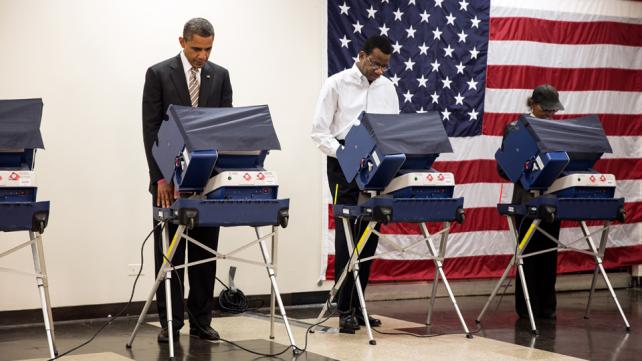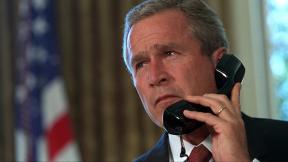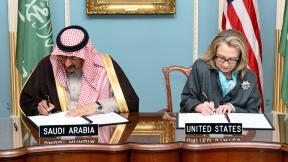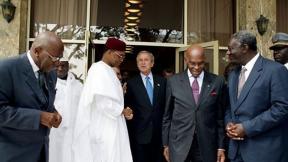
When a few days before election 2004 a BBC reporter asked me about the possibility of election fraud, I felt deeply offended and start defending America. I told him these were not elections being held in a Third World country. This was America.
Now I am beginning to feel my defense was based more on nationalistic reaction than the truth.
President Bush's campaign did a superb job and he has won the elections. But would he win Ohio based on all the issues on the table? Probably not. I am convinced there are serious problems in our voting and vote counting system which require thorough, independent and bipartisan investigation as well as open debate to restore confidence in the US electoral system. Otherwise, the ghost of Florida from election 2000 will grow larger and with bad news coming from Ohio, may become a monster.
After more than a month, the question still lingers in the blogsphere: were the November 2 United States presidential elections fair? The mainstream media is now finally starting to pick up this issue as a story which may not alter the election results.
Ohio was THE state to decide whether Bush or Kerry would win the elections. Ohio has now announced the formal certification of the results of the 2004 presidential election in the state on December 6, with acknowledgements that there were problems, glitches and hiccups in the counting, something which has been a cause for much concern. President Bush won Ohio by 118,775 votes.
A recount of Ohio votes is bound to happen. However, it will not alter the final outcome since there is not much time before the electoral college meets and votes on December 15 and the Congress certifies the election on January 6, 2005. Senator Kerry's concession was a strategic and patriotic move to avoid the chaos of election 2000 at a very sensitive time for America.
But none of this will end the controversy surrounding the 2004 elections.
Libertarian presidential candidate Michael Badnarik and Green Party candidate David Cobb are seeking a recount with lukewarm support from Democrats.
The ranking minority member of the House Judiciary Committee, John Conyers, Jr. of Michigan, is holding a hearing to investigate allegations of vote fraud and irregularities in Ohio during the 2004 Presidential election. The Democratic National Committee has announced it would launch its own investigation into election issues in Ohio. And at the request of 14 Democratic Congresspersons, the General Accountability Office (GAO) has announced that it will be investigating.
Summary of Problems:
There are over 30,000 complaints of vote suppression and difficulties in voting lodged with the Election Incident Reporting Service (EIRS).
In sum, some of the problems with the election were: electronic vote undercount and overcount; long lines; a shortage of machines; a pattern of problems in predominantly African-American neighborhoods compared to shorter distances and plenty of machines for potential Bush voters; different state standards regarding the voting rights of ex-convicts; and pre-election intimidation of voters.
Electronic Voting Problems:
The biggest problems were with electronic voting machines.
In one Ohio precinct, there were only 600 total voters but about 4,000 votes for Bush showed up according to an Associated Press report. This error was caught by the precinct and corrected. The question is, was this machine and software unique to that location or used in many other locations? If it was used elsewhere, then this software error may have occurred in other places. Has it? Where else was this software used and in what conditions did this error occur?
Some statisticians have projected a huge number of votes assigned by these machines in favor of Bush. The following points give enough credibility to this problem deserving a through bipartisan investigation:
-
The machines were running on the Windows operating system which is well known to have problems and has often been the victim of literally hundreds and thousand of hackers.
-
The machines were running on source code that is held as secret, proprietary information (so there can be no public review).
-
The voting machines and software were developed by companies whose executives were committed to Bush's reelection. Walden O'Dell, Diebold's chairman and chief executive, said in a fundraising letter for the Ohio Republican Party that he was "committed to helping Ohio deliver its electoral votes" to Bush.
-
One-third of people in the US voted on electronic machines that provide no paper receipt for the vote, making recounts impossible and auditing difficult.
It seems like even Venezuela has a better electronic voting system than we do.
The ghost of Florida
A thorough independent bipartisan investigation of our electoral process is crucial in consideration of what happened in Florida in 2000 and what has happened in Ohio.
In 2000, for the first time, the honesty of the presidential elections was questioned. The state where President Bush's brother Jeb Bush is governor, ordered the implementation of a purge list disenfranchising thousands of eligible voters, mainly African-American. They were prevented from casting ballots through their largely erroneous classification as convicted felons.
Then there were chad votes. Chads are small pieces of paper or cardboard produced from punching paper tape or data cards. In the 2000 elections, due to erroneous punch card ballots, chads clung to the ballots and made them unreadable, and so those votes were canceled.
European Recommendations
Concerns that arose about the 2000 election led the US government to invite observers from Europe's Organization for Security and Cooperation in Europe (OSCE) to monitor this year's elections. These observers have said that by and large, the 2004 elections were correctly conducted. Although this body is not being welcomed in the current Ukrainian election crisis and a call has been made for reforming the OSCE. But they did note a few problems in their report:
-
The electoral process needs to be uniform throughout the country.
- There was considerable confusion and varying approaches from one state to another regarding the use of provisional ballots.
-
American citizens who are former felons were not allowed to vote in all states. The report recommended establishing one uniform policy for the whole country.
-
Protracted waiting periods may have deterred or prevented some voters from participating in the election.
- Poll workers displayed varying levels of knowledge on correct procedures. It was not clear that Poll workers had generally received sufficient training to perform their functions.
- Occasional faults and breakdowns of DRE machines sometimes resulted in delays for voters.
Conclusions:
Although finance reform and false advertising during the election campaign remain two areas that need to be improved in the larger electoral picture, The truthfulness of our voting system is an urgent requirement of our democracy.
It is also important to note that African-Americans felt their votes were not properly counted because of long lines, a small number of voting machines and The issue of voters who are felons. Muslim Americans were intimidated because of pre-election FBI "visits" in which about 700 were arrested and close to 10,000 interviewed before election according to an Associated Press report.
Before The Florida ghost becomes a monster casting doubt about our electoral democracy, it is important to properly research, investigate, develop a bipartisan mechanism to decision making to ensure proper voting and proper counting.
"Barack Obama votes in the 2012 election" by Pete Souza - White House (P102512PS-1706). Licensed under Public domain via Wikimedia Commons - http://commons.wikimedia.org/wiki/File:Barack_Obama_votes_in_the_2012_election.jpg#mediaviewer/File:Barack_Obama_votes_in_the_2012_election.jpg








Add new comment